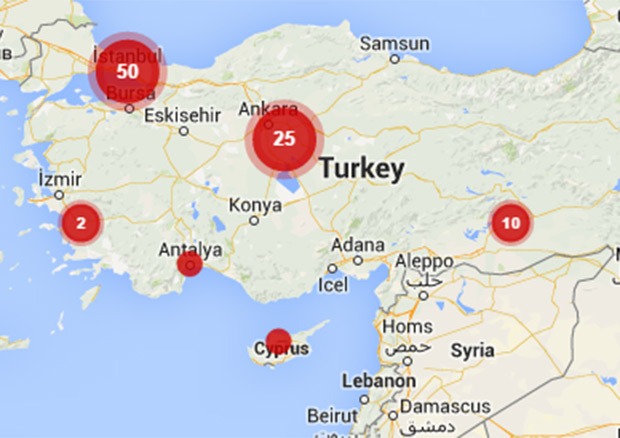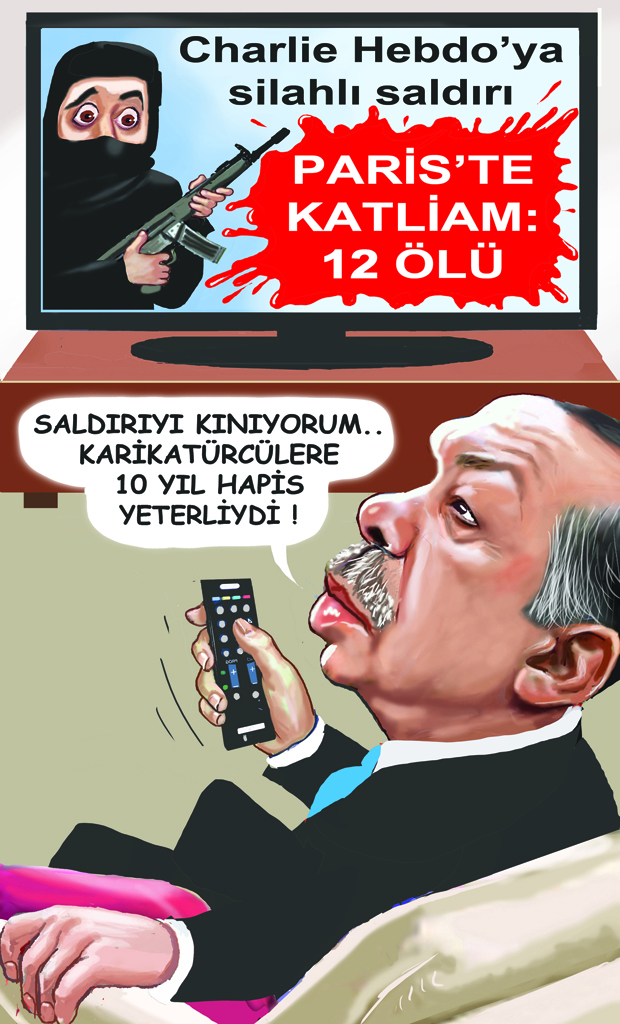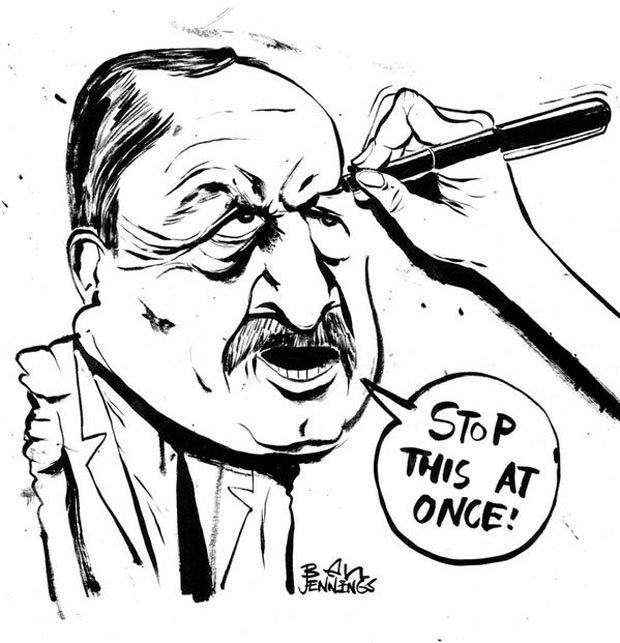Index relies entirely on the support of donors and readers to do its work.
Help us keep amplifying censored voices today.

Index on Censorship’s project to map media violations in the European Union and candidate countries has recorded 74 incidents in Turkey since May 2014.
Richard Howitt MEP is foreign affairs spokesperson for both the Labour Party and the Socialist and Democrat Group in the European Parliament and is a member of its joint parliamentary committee with the Turkish Parliament
As millions mourn the shooting of journalists in France, the European Parliament convening this week in Strasbourg today extended the fight for freedom of expression to legal threats, harassment and character assassination against free journalism in Turkey.
Indeed last weekend’s scenes reminded me of the hundreds of thousands who went on to the streets after the Turkish writer Hrant Dink was shot in 2007 and my deep regret that, despite the work of a foundation established by his widow, the situation in Turkey appears to have got worse not better in the intervening years.
A resolution voted for by MEPs was provoked by dawn police raids on newspapers and television stations in December that led to the arrest of 31 people, mainly journalists, on charges of terrorism – which carry some of the gravest sentences under the Turkish penal code.
Two of the leading journalists arrested openly admit sympathies for the US-based cleric Fethullah Gulen ,whose followers withdrew support from the country’s governing AKP party and whose so-called ‘movement’ does indeed deserve greater scrutiny.
Nevertheless reports suggest no evidence was presented of actual criminal intent against those arrested, with the crackdown fitting a pattern of legal harassment, smears and threats against those who provide political opposition to the government or who critically report on corruption allegations against it.
Our resolution also condemns the recent arrest of a Dutch journalist, demonstrating how foreign journalists are not exempt from attack.
Correspondents of The Economist, Der Spiegel and the New York Times in Turkey have all been threatened, with one CNN correspondent forced to flee the country after being accused of espionage.
Previous attempts to ban social media are also being revived in the country this week, in an apparent attempt to suppress reports Turkey’s intelligence organisation may have been implicated in the supply of arms to ISIS fighters in Syria.
As someone who is proud to call himself a friend of Turkey, and a keen proponent for the country’s accession to the EU, it is with a heavy heart I sign up to such criticisms.
However in negotiations I had to argue against opponents of the country seeking to use this latest incident to introduce wording that would have imposed immediate financial penalties against Turkey or put up new barriers in the membership negotiations.
I did so because politicians as well as journalists must not allow ourselves to be trapped in to self-censorship. On these arrests, it was our duty to speak out.
I am saddened explanations that the release of all but four of the journalists given to me and to my fellow MEPs by the Turkish representative in Strasbourg this week seemed wantonly to ignore the climate of fear and self-censorship which remains inflicted on the country’s press as a result.
It is the blatant denials that undermine trust and confidence with those of us who want to support reform efforts in the country, and which one very senior EU official told me had led to “desperation” in the telephone calls between Brussels and Ankara which followed the arrests.
Meanwhile, former prime minister Recep Tayyip Erdoğan, now elected as the country’s president, reacted characteristically by telling a news conference: “Nowhere in Europe or in other countries is there a media that is as free as the press in Turkey.”
The sober truth is that Turkey ranks 154 out of 180 in press freedom according to the Reporters Without Borders index last year.
The annual survey by the Committee to Protect Journalists, published only last month, showed Turkey amongst the top ten countries in the world for imprisoning journalists, ranking alongside Azerbaijan, Iran and China.
However, Erdogan’s protestations must be put in to a context where he also rebuffed European criticisms of the arrests saying the EU should “mind its own business”, and last week when he was prepared to partly attribute the Charlie Hebdo terrorist attack to “Western hypocrisy”.
Today’s European Parliament vote ascribes that hypocrisy instead to the government in Ankara.
I wonder whether the Turkish press will fairly report even this?
This article was posted on 15 January 2015 at indexoncensorship.org
In October, Turkish cartoonist Musa Kart was the subject of a global solidarity campaign from his fellow artists. Kart was facing nine years in jail for insulting President Recep Tayyip Erodgan through a caricature for Cumhuriyet, where he commented on Erdogan’s alleged hand in covering up a high-profile corruption scandal. In response, his colleagues from around the world rallied in support of Kart, publishing their own #ErdoganCaricature on Twitter, and he was acquitted of the charges. This time, Kart is joining cartoonists in standing with Charlie Hebdo.
Kart told Index he feels “so sorry” and he has “lost his brothers” in last Wednesday’s brutal attack on the French satirical magazine’s offices, where 12 people — including cartoonists Stéphane Charbonnier aka Charb, Jean Cabut aka Cabu, Georges Wolinski and Bernard Verlhac aka Tignous — were killed.
Kart also ran into trouble with Turkish authorities back in 2005, when he was fined 5,000 Turkish lira for drawing then-Prime Minister Erdogan as a cat entangled in yarn. Kart puts the spotlight on Erdogan’s chequered history with cartoonists rights in a second piece, where the president declares that: “I condemn the attack. Ten years prison would have been enough for the cartoonists.”

TV: “Massacre in Paris. Twelve dead.” President Erdogan: “I condemn the attack. 10 years prison would have been enough for the cartoonists.”
Erdogan condemned the “heinous terrorist attack” and Turkey’s Prime Minister Ahmet Davutoglu joined last Sunday’s march for unity in Paris. Much has been made of the apparent hypocrisy of world leaders who have suppressed free speech at home, taking part in what many considered a defiant show of support for that very right.
As Index CEO Jodie Ginsberg pointed out, Turkey imprisons more journalists than any other country in the world. Index’s media freedom map has received 72 reports of press freedom violations from Turkey since May 2014 alone. In the wake of the attacks in Paris, other Turkish cartoonists have been threatened by pro-government social media users. Police also raided the printing press of Cumhuriyet, as it prepared to publish selections from today’s issue of Charlie Hebdo.
Ecuadorian cartoonist Xavier Bonilla — known as Bonil — has also been targeted for his work. In 2013, the country got a new communications law which allows the government to fine and prosecute the media. After drawing a cartoon for El Universo, based on a raid on the home of a journalist and opposition advisor, Bonil became a victim of the new legislation. President Rafael Correa — who has been known to personally file lawsuits against critical journalists — ordered that a case be opened against the cartoonist. It found that his piece had invited social unrest and should be “rectified”, while El Universo was fined $92,000.
“I believe that humour is the best antidote to fear and the best defence against abuses of power. I have been drawing for 30 years, and I am not going to back down,” he wrote in an article in the current issue of Index on Censorship magazine.
Below are his cartoons in support of Charlie Hebdo.
This article was posted on 14 January 2015 at indexoncensorship.org

Turkish President Recep Tayyip Erdogan (Photo: Philip Janek / Demotix)
What’s wrong with Turkey? Or, more to the point what is wrong with Turkey’s president that makes him so determined to fight, like a two a.m. drunk vowing to take on all comers?
In the past week alone, Turkey’s President Recep Tayyip Erdoğan and his allies have launched attacks on his former ally Fethullah Gülen and his followers, novelists Orhan Pamuk and Elif Shafak, and even supporters of Istanbul soccer club Besiktas. It would be foolish to attempt to rank these attacks in terms of importance or urgency, but the attack on the Gülenites is the most interesting.
The Gülen movement was almost unknown to anyone outside Turkey and the Turkish diaspora until 2008, when Fethullah Gülen topped an online poll run jointly by Prospect and Foreign Policy magazines. The poll was almost certainly hijacked by members of the movement, which its leader modestly claims doesn’t really exist (“[S]ome people may regard my views well and show respect to me, and I hope they have not deceived themselves in doing so,” Gülen conceded in an interview with Foreign Policy. “Some people think that I am a leader of a movement. Some think that there is a central organization responsible for all the institutions they wrongly think affiliated with me. They ignore the zeal of many to serve humanity and to gain God’s good pleasure in doing so.”)
The movement, known to some as “Hizmet”, is seen as bearing great power in Turkey. In a country well used to conspiracy theories about secret organisations — such as the perceived ultra-nationalist, ultra-secular Ergenekon — it is unsurprising that the Gülenists attract suspicion. Their cultishness does little to allay that sentiment.
Among the many weapons at the disposal of the movement are its newspapers, the Turkish Zaman and English-language Today’s Zaman. It was journalists from Zaman, among others perceived as Gülenites, who were arrested over the weekend, as reported by Index.
The move by Erdoğan against Gülenists is widely seen as part of Erdoğan’s defence against allegations of corruption within his party — allegations he believes are led by Gülenists within the police and other agencies.
With their journalists arrested, the Gülenists now find themselves facing the kind of censorship they themselves espoused not so long ago.
In 2011, journalist Ahmet Sik was working on a book called Army of the Imam, which was sought to expose the Gülenists’ connections with the police. The manuscript was seized by authorities. When Andrew Finkel, then a columnist with Today’s Zaman (and occasional Index contributor), submitted an article suggesting that the Gülen movement should not support such censorship, he was sacked by the paper. (The column subsequently appeared in rival English-language newspaper Hurriyet Daily News)
It’s tempting amid all this to wish for a plague on all their houses. But as one Turkey watcher pointed out to me, it’s inevitable that some innocents will get caught in the crossfire between the former allies in Erdoğan’s Islamist AK party and the Gülen movement.
Meanwhile, in keeping with the paranoid style of Turkish politics, pro-Erdoğan newspaper Takvim identified an external enemy in the shape of an “international literature lobby”.
The agents of that lobby, which is clearly anti-Turkish rather than pro-free speech, were identified as Orhan Pamuk and Elif Shafak. It is, in its own way, true that Shafak and Pamuk are part of the international literature lobby: London-based Shafak can often be seen at English PEN events, and Pamuk has long been identified as a literary and free speech hero around the world. But it is an enormous stretch to imagine that the novelists of the world are gathering in smoke-filled rooms plotting the overthrow of the Turkish state, rather than just hoping that Turkish people should be allowed write and read books in peace. Takvim went as far as to imagine that the authors were paid agents of the “literature lobby”, which is to make the terrible mistake of imagining there’s money in free speech. No matter: paranoia excels at inventing its own truths.
Amidst all this, less glamorous than Pamuk and Shafak, less powerful than Gülen and Erdoğan, fans of Besiktas football club too face persecution. The “Çarşı” group are claimed to have attempted a coup against the government after playing a prominent role in the Gezi park protests. Supporters of the tough working class Istanbul club, known as the Black Eagles, have a reputation for anti-authoritarianism and political activism. According to Euronews’ Bora Bayraktar: “While the court’s verdict is uncertain, what is known is that the Çarşı fans – often proud to be ahead of their rivals – have become the first football supporters’ group to be accused of an attempted coup.”
A source in Istanbul tells Index that when asked how he answered to the charge of fomenting a coup, one accused supporter replied: “If we’re that strong we would make Beşiktaş the champions!”, a prospect as unlikely for the underdog club as a dull but functioning liberal democracy seems for Turkey.
This article was posted on 18 December 2014 at indexoncensorship.org

Cartoonists like Ben Jennings rallied around Musa Kart when he faced jail over a caricature of Turkey’s President Erdogan (Credit: Ben Jennings)
Not long ago Turkish cartoonist Musa Kart faced the prospect of spending nine years behind bars, simply for doing his job.
Taken to court by the Turkey’s President (and former Prime Minister) Recep Tayyip Erdogan himself, Kart last week stood trial for insult and slander over a caricature published in newspaper Cumhuriyet in February. Commenting on Erdogan’s alleged hand in covering up a high-profile corruption scandal, the cartoon depicted him as a hologram keeping a watchful eye over a robbery.
While Kart was finally acquitted last Thursday, his case was just starting to hit international headlines — in no small part due to the swift reaction from colleagues around the world. In the online #erdogancaricature campaign initiated by British cartoonist Martin Rowson, his fellow artists shared their own drawings of the president. With Erdogan reimagined as everything from a balloon, to a crying baby, to Frankenstein’s monster, the show of solidarity soon went viral.
“This campaign has showed me once again that I m a member of world cartoonists family. I am deeply moved and honoured by their support,” Kart told Index in an email.
Kart has been battling the criminal charges since February. His defiance was clear for all to see when he told the court on Thursday that “I think that we are inside a cartoon right now”, referring to the fact that he was in the suspect’s seat while charges against people involved in the graft scandal had been dropped.
He remains defiant today: “Erdogan would have either let an independent judiciary process to be cleared or repressed his opponents. He chose the second way,” he said. “It’s a well known fact that Erdogan is trying to repress and isolate the opponents by reshaping the laws and the judiciary and by countless prosecutions and libel suits against journalists.”
This isn’t the first time Kart has run into trouble with Erdogan. Back in 2005, he was fined 5,000 Turkish lira for drawing the then-prime minister as a cat entangled in yarn. The cartoon represented the controversy that surrounded Turkey’s highest administrative court rejecting new legislation that Erdogan had campaigned on.
“I have always believed that cartoon humour is a very unique and effective way to express our ideas and to reach people and it contributes to a better and more tolerant world,” he explained when questioned on where he finds the strength to keep going.
It remains unclear whether the story ends with this latest acquittal decision. While the charges against Kart were dropped earlier this year, an appeal from Erdogan saw the case reopened. “Erdogan’s lawyers will…take the case to the upper court,” he said.
Kart’s experience is far from unique; free expression is a thorny issues in Erdogan’s Turkey. In the past year alone, authorities temporarily banned Twitter and YouTube and introduced controversial internet legislation. Meanwhile journalists, like the Economist’s Amberin Zaman, have been continuously targeted, as Index on Censorship’s media freedom map shows.
Kart is not optimistic about the future of press freedom in his country: “Unfortunately, day by day, life is getting harder for independent and objective journalists in Turkey.”
This article was originally posted on 31 October at indexoncensorship.org